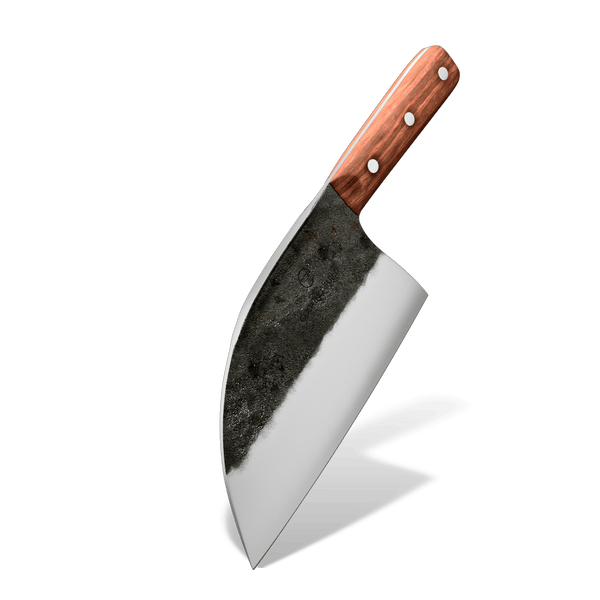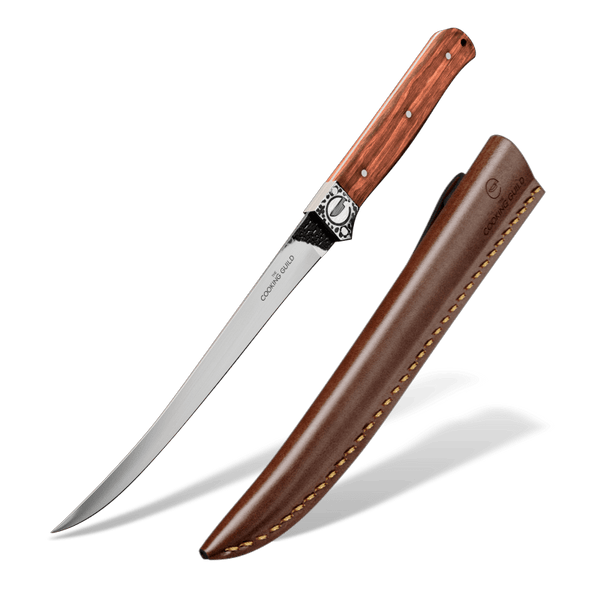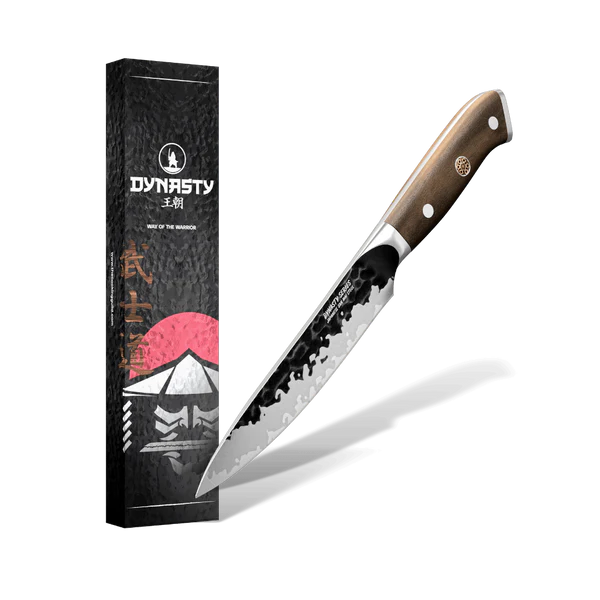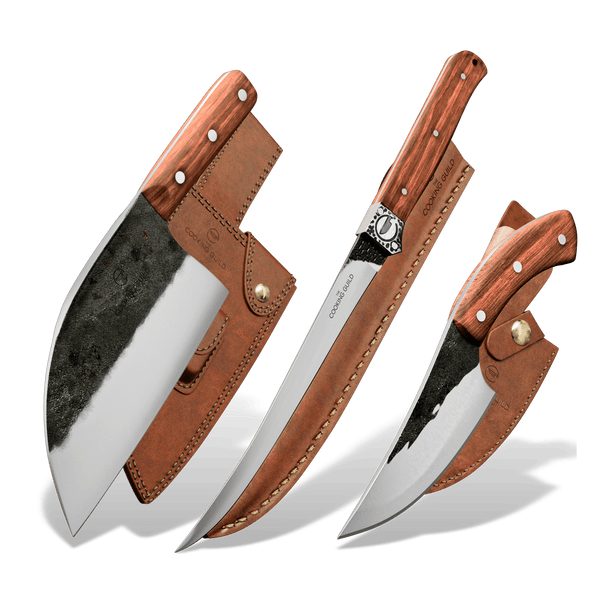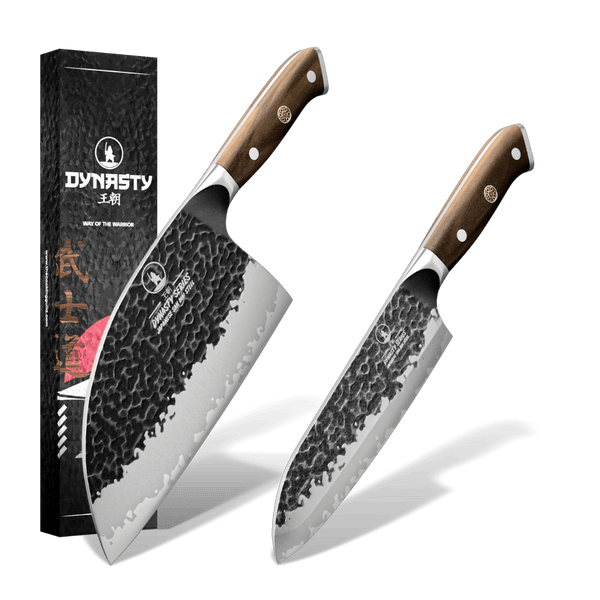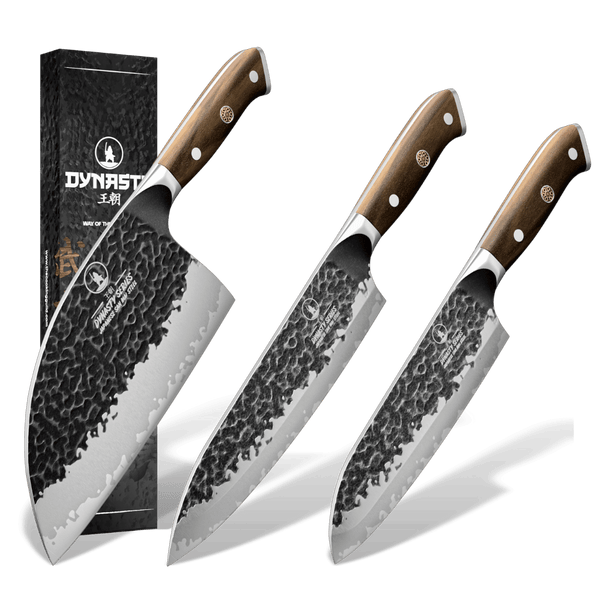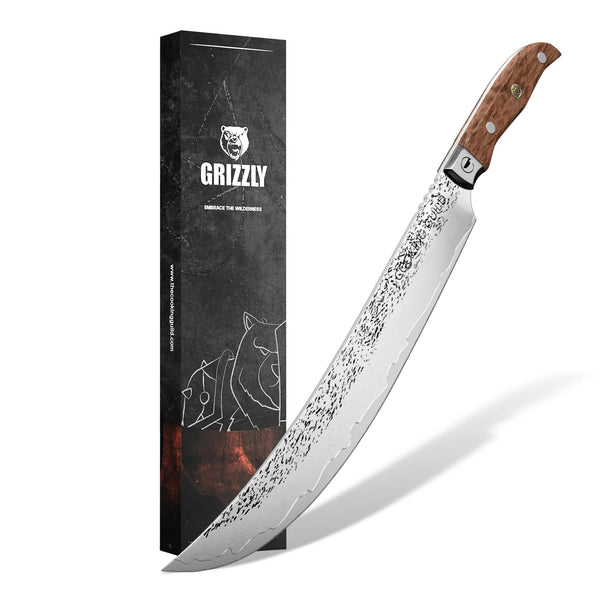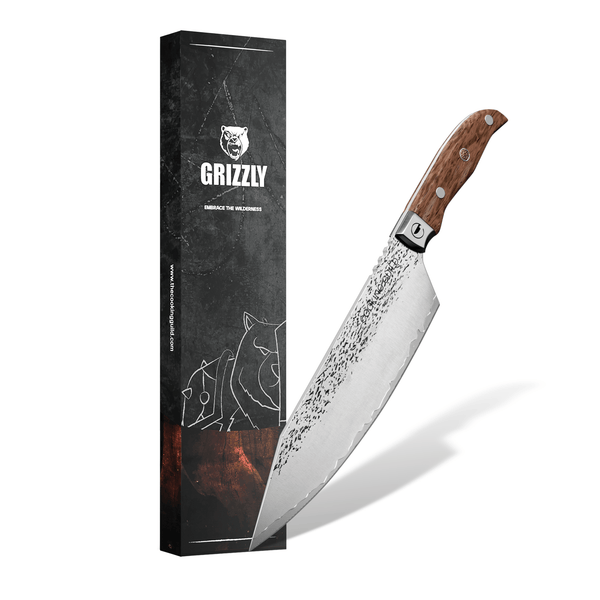Metallurgy is an art form steeped in tradition and history, requiring high accuracy and skill. Among the many alloys and methods that have adorned this industry, Damascus steel is shrouded in mystery and reverence. The stories of its pattern welded in distinctive form have been the talk of the town even after centuries from its origin. This blog will explore various aspects of Damascus steel, including its origin, uses, benefits, and tips for caring for your Damascus steel knife.
The Lost Art of Real Damascus Steel
The long-lost ability to forge real Damascus steel has a special place in the history of metalworking. This metal, known for its exceptional durability and unique wavy patterns, originated in the Middle East over 1700 years ago.
The process of forging this tough metal is extremely painstaking. Expert blacksmiths folded, welded, and heat-treated many layers of steel to create a blade with exceptional resilience and edge retention. It has been revered for generations because of its legendary quality and efficiency.
Unfortunately, historical documentation of the methodology has been lost, hindering the reinvention of this art form. Modern metallurgists work hard to faithfully duplicate this extraordinary steel, emphasizing Damascus steel's core characteristics rather than adding extraneous details. The ongoing search for this vanished art form is a sobering reminder of the value of preserving authentic workmanship and legacy without embellishment.
What Is Damascus Steel?
Damascus steel is a catchall word for an age-old, flexible, yet extremely strong metal. The forging and stacking process gives this kind of steel its distinctive wavy or mottled appearance.
Original and Reinvented Damascus Steel
Damascus steel, whose origins are mysterious, was originally made in the Middle East. Its extraordinary toughness and razor-like edge came from the laborious forging process for which it became famous. Damascus steel has had a renaissance in popularity in the present times. Metalworkers and blacksmiths have made it their mission to revive this ancient craft by applying modern techniques to age-old methods.
Why Is It Called Damascus Steel?
Damascus steel was first created in the Syrian city and later spread to other regions. Historical evidence shows the production of this sought-after steel variant globally, from Indonesia to the Middle East, dating back millennia.
The sixth century was a watershed year in the history of Damascus Steel. John Verhoeven's research of Damascus' composition revealed the presence of both pattern-welded and Wootz steel varieties, highlighting the latter's superior properties.
Weapons made from these types of steel were revered not just for their low weight and durability but also for their ability to keep a keen edge under the stresses of warfare.
What Is the Damascus Pattern?
Damascus Steel is recognized for its signature design, which includes undulations, wavy lines, and swirls. Different kinds of steel are layered and folded to create this design during the forging process. Each piece of Damascus steel has its distinct look since the procedures and materials used have changed.

Uses of Damascus Steel
Damascus Steel has a long history, during which it has been famous for its unparalleled toughness, edge retention, and beautiful designs. Its high-carbon and low-carbon steel layers gave the Middle Eastern blade exceptional longevity and edge retention.
Real Damascus steel is prized for its combination of practicality and artistry, which has increased its use for high-end kitchen knives, razors, and decorative pocket knife. Artists, designers, and collectors use it for its ability to merge classic aesthetics with modern functionality.
The Beauty Of Modern Damascus Steel
The beauty and artisanal quality of modern Damascus steel is unparalleled. It's well-known for its extraordinary longevity and beautiful, complex designs. It is forged from many layers of metal to generate distinctive, wave-like patterns evocative of traditional swords. Modern Damascus steel is strong and sharp, not just for show. This steel makes blades, knives, and jewelry that are works of art that combine tradition and innovation in metallurgy. So, it's not simply sturdy but also a beautiful object that serves its purpose well.
What Makes a Damascus Knife Unique?
A Damascus knife is created by skillfully forging Wootz and pattern-welded steel together to form a single blade. These techniques have been used for thousands of years and contribute to the knife's unique characteristics.
Forging Wootz Steel
Iron and steel are smelted along with other elements like sand and glass to produce Wootz steel. Wooden chips are added to the molten iron, converted to carbon, and incorporated into the metal. It is repeatedly forged, cooled, and pressed until the metal contains 1% carbon and impurities.
Damascus folds are the recognizable wave pattern created by the steel's extended layers of concentrated precipitates. After the Damascus steel knife has been polished, the distinctive pattern is brought out using acid etching.
Pattern-welded Steel
Modern pattern welding involves heating and hammering many layers of iron and steel until they fuse into a billet or bar. After creating multiple layers, typically around 40, the metal bar is folded, heated, and pounded again. The acid etching process makes the wave and twist designs stand out more clearly.
Even though pattern welded blades have a carbon content of less than 1%, they are preferable to traditional Wootz steel blades because of their higher layer uniformity and lower impurity levels. Today, this is the standard process for making Damascus Steel knife.
How Do You Identify Real Damascus Steel?
Distinguishing real Damascus steel from fakes can be challenging, but many techniques can help you identify real steel from fake ones.
Examine the Blade
Inspect the knife's edge thoroughly first. Damascus steel blades are recognized by their distinctive wave-like patterns, known as "Damascus folds." The blade's surface should show these patterns, which are caused because of the stacking and forging processes.
Exclusive Acid Etching
Another reliable indicator is acid etching. Damascus steel blades are frequently acid-etched to highlight the pattern. Fake copies may not have the same degree of detail in their etchings, making it harder to see the patterns.
Price
Another metric that distinguishes real steel from fake ones is cost. True Damascus steel is the result of painstaking labor and high-grade materials. It is thus more expensive than knockoffs because of its authenticity.
The Best Approach to Distinguish Genuine Damascus Steel from Counterfeit Replicas
To identify authentic Damascus steel from fakes, examine the blade's unique pattern, inquire about the acid etching process, and be cautious of prices that seem too good to be true. Japanese Damascus steel, which has long been esteemed for its exceptional quality, remains a hallmark of excellence in metalworking.

Where Can I Buy a Genuine Damascus Steel Knife?
You can buy a Damascus steel knife online or from a store. Genuine Damascus steel blades are available at several high-quality knife shops and specialist cutlery retailers.
Can I Buy Authentic Damascus Steel Knives Online?
As demand rises for such fine blades, more and more are becoming available on digital marketplaces. TheCookingGuild is a trusted online retailer where you can get genuine Damascus steel knives.
Their team will provide all the necessary information, including how and when they are forged. Additionally, read their online reviews and ensure the work's patterns and quality are clear. If you take the time to find a reputable dealer and an authentic Damascus steel knife, you can add a beautiful and robust knife to your collection of kitchen knives.
Real Damascus Steel Knives at The Cooking Guild
Looking for high-quality stainless-steel knives? The Cooking Guild has an impressive collection of real Damascus steel knives in our ONYX Series. We proudly sell genuine pattern-welded Damascus in beautiful designs and exceptional resilience.
Each knife is a unique work of art, the product of the hands of expert artisans, and a fine addition to any cook's arsenal. Whether you're a skilled chef or want to experiment in the kitchen, the genuine Damascus steel knives from The Cooking Guild are an investment worth making. We have everything from your everyday Chef Knife, a Serbian Cleaver to a precision Hanta Knife for the finer tasks. It's the perfect combination of time-honored methods and cutting edge techniques, guaranteeing each diner an unforgettable meal.
Benefits of a Damascus Steel Knife
A Damascus steel knife's advantages go well beyond its eye-catching aesthetic. These kitchen knives are highly esteemed by professional chefs and home cooks due to their exceptional capabilities and quality. Here are some of its benefits:
Durability
Damascus steel knives are best known for their durability and toughness. The stacking and casting method makes a blade that stays sharp even after much use.
Beauty
Such blades are known for their beautiful, signature wave patterns, which indicate the skill and care that went into their production.
Corrosion Resistance
Since many Damascus steel knives are crafted from high-quality stainless steel, they are very resistant to corrosion and stains.
Performance
Damascus steel knives are the best in the world because of their sharpness and accuracy. They make it easy to cut through items, making cooking smooth and fun.
Value
These steel knives are an investment that pays for itself over time because of their durability and effectiveness. They often outlive other knives.
Customization
Several knife manufacturers provide customizable choices, from the grip material to the blade size.
Forging Technique
The blade made from Damascus steel has an exceptional blend of toughness and flexibility due to the Wootz steel and pattern-welded processes used to create it.

Common Misconceptions
Many think that Wootz steel is the ultimate source of all Damascus steel. However, contemporary Damascus steel uses a variety of alloys and forging processes to create distinctive patterns.
Another common misconception is that the more folds in Damascus steel, the better. Contrary to popular belief, the visual pattern does not always signify better performance and only represents the layering process.
Damascus steel blades are not indestructible. They can crack or shatter if subjected to excessive force or overuse. Additionally, not all Damascus steel blades are rust or stain-resistant despite common assumptions. It is important to take good care of them to avoid damage. Lastly, while Damascus blades can have incredible sharpness, it ultimately depends on the sharpener's skill to achieve the best results.
How to Properly Care for Your Damascus Blades
Damascus blades need special care to maintain their durability and effectiveness. Wipe them off with warm, soapy water and a gentle sponge or towel after each use. Don't use anything abrasive, like steel wool or a scouring pad, or risk ruining the intricate designs. Remove moisture from the blade by drying it with a clean towel.
Keep your Damascus knife sheathed in a blade guard or block to protect its sharp edge when not in use. Prevent corrosion by oiling the blade regularly. By adhering to these guidelines, your Damascus blades will continue to look and perform like new for many years.
What Is the Black Residue on My Knife After Cleaning?
The black residue on your knife after cleaning is either a mix of metal fragments, soap film, and dried water droplets. Just use a dry towel to wipe the blade to get rid of it. You may need a mild abrasive like baking soda or a specialized cleaner to remove certain stains. You may avoid the formation of such residue by giving your knife a thorough rinsing and drying after each usage.

Frequently Asked Questions
Does the Cooking Guild also sell stainless steel blades?
Yes, besides their Damascus steel knives, The Cooking Guild also provides an assortment of stainless steel blades including our best-selling Nomad Series.
Is every knife from The Cooking Guild crafted by hand?
The Cooking Guild's knives are all handmade with care and accuracy by talented artisans.
Is Damascus Steel good?
Damascus steel is a popular material for blades because of its high quality, strength, sharpness, and attractive patterns.
Is Damascus Steel the strongest steel?
Damascus steel is not always the strongest, although it is incredibly strong. The alloy and the heat treatment contribute to the final product's strength.
Is it possible to produce authentic Damascus steel in the modern era?
Because of technological advancements, Damascus steel can now be manufactured with all the same characteristics as ancient ones.
Is real Damascus Steel expensive?
True, genuine Damascus steel knives may be rather pricey owing to their high level of workmanship and durability.
Can you fake Damascus Steel?
Some imitations attempt to replicate Damascus steel's appearance, but genuine Damascus steel is easily recognizable because of its layered patterns and superior durability.
Do Damascus patterns fade?
Regular usage and honing may dull the Damascus patterns over time, but acid etching can bring them back to life.
Can I sharpen Damascus Steel knives?
Yes, you can sharpen Damascus steel blades. However, it is crucial to utilize the appropriate sharpening methods and equipment to keep them sharp.
What is Wootz Steel?
Ancient Damascus steel was made from a predecessor steel called Wootz steel. Damascus steel is renowned for its purity and unique composition, both of which contribute to the exceptional qualities of Damascus blades.
